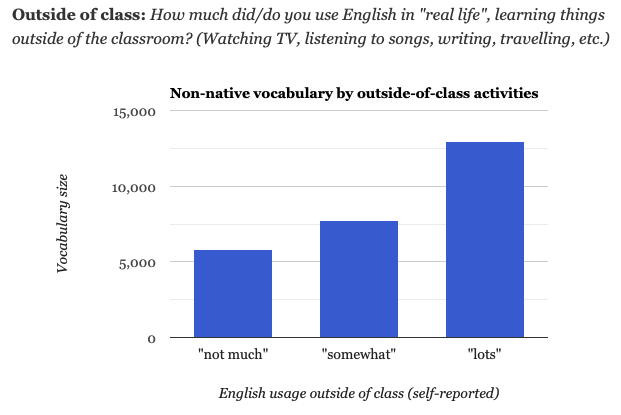
“Introverts actually get better grades and are more knowledgeable, according to research.”
“Introverted leaders often deliver better outcomes than extroverts do.”
“Some of our transformative leaders in history have been introverts.”
This is according to the woman who wrote the book on introverts, Susan Cain.
In her 2012 Ted talk she talks about the advantages and disadvantages of being an introvert.
But who has an easier time mastering English?
I do believe extroverts have some advantages.
For example, when it comes to speaking, extroverts usually want to socialize more, and that simply means they’ll speak more.
Well, if that doesn’t describe you, if you’d rather eat glass than talk about the weather with a stranger, I have good news.
There’s one huge advantage introverts have that extroverts do not.
And I’ll tell you what that is, but first…
The Two-Second Introvert Test
Are you an introvert or an extrovert?
Are you sure?
How do you know?
A lot of people think being an introvert means being shy.
That’s incorrect.
I know a lot of extroverts who are socially awkward and afraid to speak in public.
And I know a lot of introverts who have are quite charming and have won awards for public speaking.
The difference is, where do you get your energy?
Does going to a party:
- drain your batteries or
- re-charge your batteries?
A typical introvert will answer A.
A typical extrovert will answer B.
The Introvert Advantage
A friend of mine who works in a busy office doesn’t like to go home after work because he lives alone.
A girl I dated (for about three seconds) only stopped talking when she needed to send a text message on her phone.
And a close family member will simply talk to himself when there’s no one who wants to talk with him.
It seems there are a lot of extroverts who can’t NOT communicate.
But every introvert I know can travel between the two words of socializing and being alone.
This is your super power.
Because during these alone times you can do something that many extroverts simply hate doing.
And that is, reading, watching TV and listening to English by yourself.
Which also happen to be three of the best ways to improve your English.
The #2 Myth About Speaking
In this post I told you that the #1 myth about speaking is that speaking improves speaking.
The #2 myth is that speaking is the only way to improve your speaking.
WRONG!
Speaking is good for building your confidence:
“When I speak with Teacher Bob he understands me; therefore, I’m confident our clients from Manchester will understand me at the meeting.”
Speaking is good improving your fluency:
BEFORE SPEAKING PRACTICE:
“Tomorrow I need to go to the… garage to get my car’s… oil… changed.”
AFTER SPEAKING PRACTICE:
“Tomorrow I need to go to the garage to get my car’s oil changed.”
But what about learning new words?
And what about growing your vocabulary? Learning new words?
Improving your grammar?
Perfecting your pronunciation?
You know, it’s hard to learn when your mouth is moving.
In fact, the only time you learn is when information is going in, not out.
Consider the facts:
• Children spend years listening before they speak (linguists call this “the silent period.”)
• The Vaupes Indians in Colombia, South America speak an average of six languages. Their method is to spend two years listening to the new language before trying to speak it.
• According to testyourvocab.com, English students who spend more time NOT speaking (reading, listening, watching TV, etc.) know thousands of more vocabulary words.

Now, I probably don’t know you…
But if you’re an introvert like me…
Then you probably already spend a lot of time reading, listening, and watching TV.
So here’s my advice: keep doing that.
But now do it in English.

your lesson made a lot of sense and is backed by a lot of experience
Hello